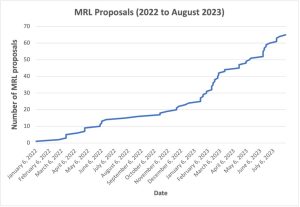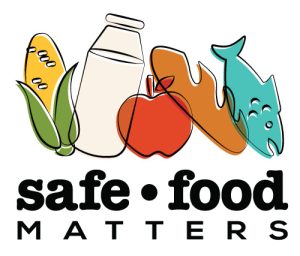Pesticide limits for sugar beet roots – the first up for MRL increases after the “pause” – are based on uncertain science
Confidential test data reveals there is “High uncertainty of [the] MRL estimate” for two increases of pesticide maximum residue limits (MRLs) on sugar beet roots (used for sugar products), which were requested by Syngenta and proposed by Health Canada. The proposed MRLs, which are 200 times and 10 times higher than current levels, were calculated using the OECD Calculator. The output page of the calculator flags in red that there is high uncertainty because small data sets were used.
Health Canada does not mention these uncertainties in its proposals for the two pesticides, PMRL 2023-34 for Fludioxonil (FL) and PMRL 2023-38 for Azoxystrobin (AZ). The proposed increases are from 0.02 to 4.0 ppm for FL, and from 0.5 to 5.0 ppm for AZ.
Notably these are two of the very first pesticide MRL increases since the June, 2023 lift of the “pause” on increases, which was first announced on August 4, 2021.
The pause was due to public outcry over proposed increases to glyphosate, and it kicked off the whole “transformation agenda” of the Pest Management Regulatory Agency (PMRA). The result of the transformation agenda (two years later) is a proposal to increase “transparency” regarding the increases (a notice will be published) – not more protective practices.
Safe Food Matters Inc. and Prevent Cancer Now warned PMRA that the OECD Calculator “overestimates” MRL levels when there is limited data, in their comments on the proposed increases of two-to four-fold for glyphosate levels in beans, peas and lentils set out in PMRL 2021-10. Safe Food Matters Inc. even showed PMRA that the White Paper from the OECD speaks to these overestimations, in its comments on the Notice of Intent NOI2023-01, and in its extensive related MRLs Backgrounder for PMRA and Health Minister and in website articles providing comments.
PMRA has ignored these warnings.
PMRA on a Mission to Increase MRLs
During the “pause”, PMRA paused increases in pre-existing MRLs, but they continued to set MRLs on new pesticides, and for new uses, at an ever-increasing rate. They also continued to work on the “paused” pesticide increase files during the pause. As of August 2023 more than 40 MRL proposals were posted in 2023—about twice as many as all of 2022, according to the PMRA consultation database. These are graphed below and available on the Prevent Cancer Now comments on Notice of Intent NOI2023-02.

Increasing the number and uses of pesticides runs completely contrary to Canada’s commitment to the Global Biodiversity Framework, which calls for cutting in half the risks from pesticides — not for increasing risks by adopting higher Import MRLs as domestic MRLs. It also runs contrary to the statutory mandate of PMRA, which is to protect Canadians and the environment from the risks of pesticides.
Delay in Providing Confidential Test Data
The confidential test data (CTD) underlying the proposals was not provided in a timely manner. The president of Safe Food Matters Inc., Mary Lou McDonald, made the requests with diligence, and also indicated the review of the CTD would be made in the public interest and that it “is essential to our public interest purpose that the public be able to see and review our comments and use them during the consultation period”.
- She asked for the dietary risk assessment for FL on July 9, 2023, and PMRA provided it on August 11, 2023, leaving less than a month for providing comments on the 75-day consultation (due September 10).
- She asked for the dietary risk assessment and other data on AZ on August 11, 2023, and PMRA provided it on August 29, 2023, leaving just over a month for providing comments on the 75-day consultation (due October 3).
PMRA refused to grant an extension to the public consultation period.
Preference for Position of Industry
PMRA is mandated to apply a “scientifically based approach” when assessing pesticides, according to the Pest Control Products Act. PMRA regularly defends its decisions on the basis that they are science-based.
Yet, PMRA has ignored and been completely NON-transparent to the public about the science when it comes to Syngenta’s proposals for FL and AZ.
Bruce Lanphear is a renowned scientist who recently resigned from Health Canada’s newly created Scientific Advisory Committee, citing an
“obsolete regulatory system that protects the pest industry more than it protects Canadians.”
The only rational explanation for PMRA’s failure on this file is either incompetence or regulatory capture – meaning PMRA prefers, puts forward and protects the position of the pesticide industry over Canadians.
Neither is good, and both require immediate redress.
Here is contact information for your MP.
(For Background Information on MRLs see: MRLs Backgrounder for PMRA and Health Minister)


